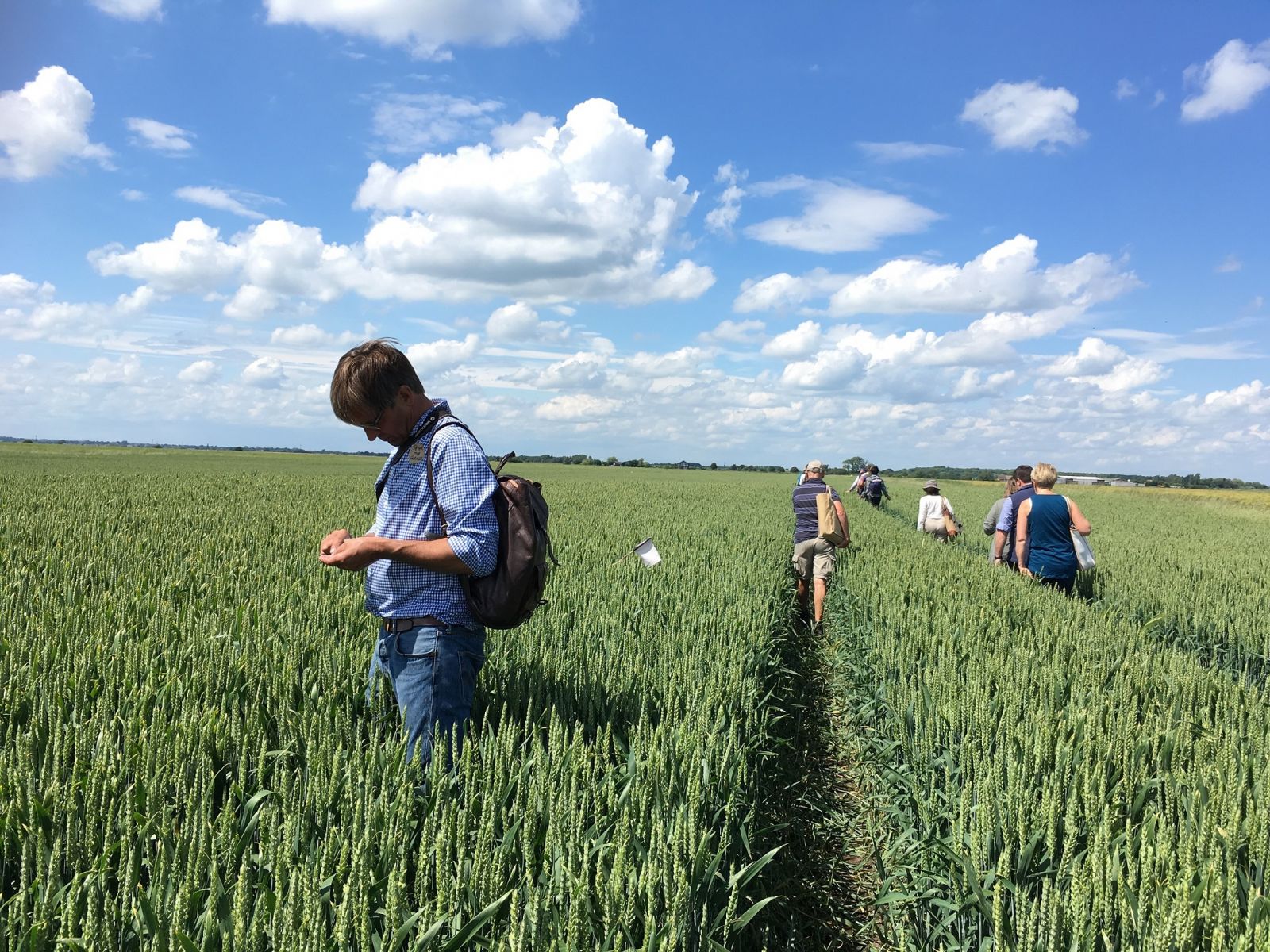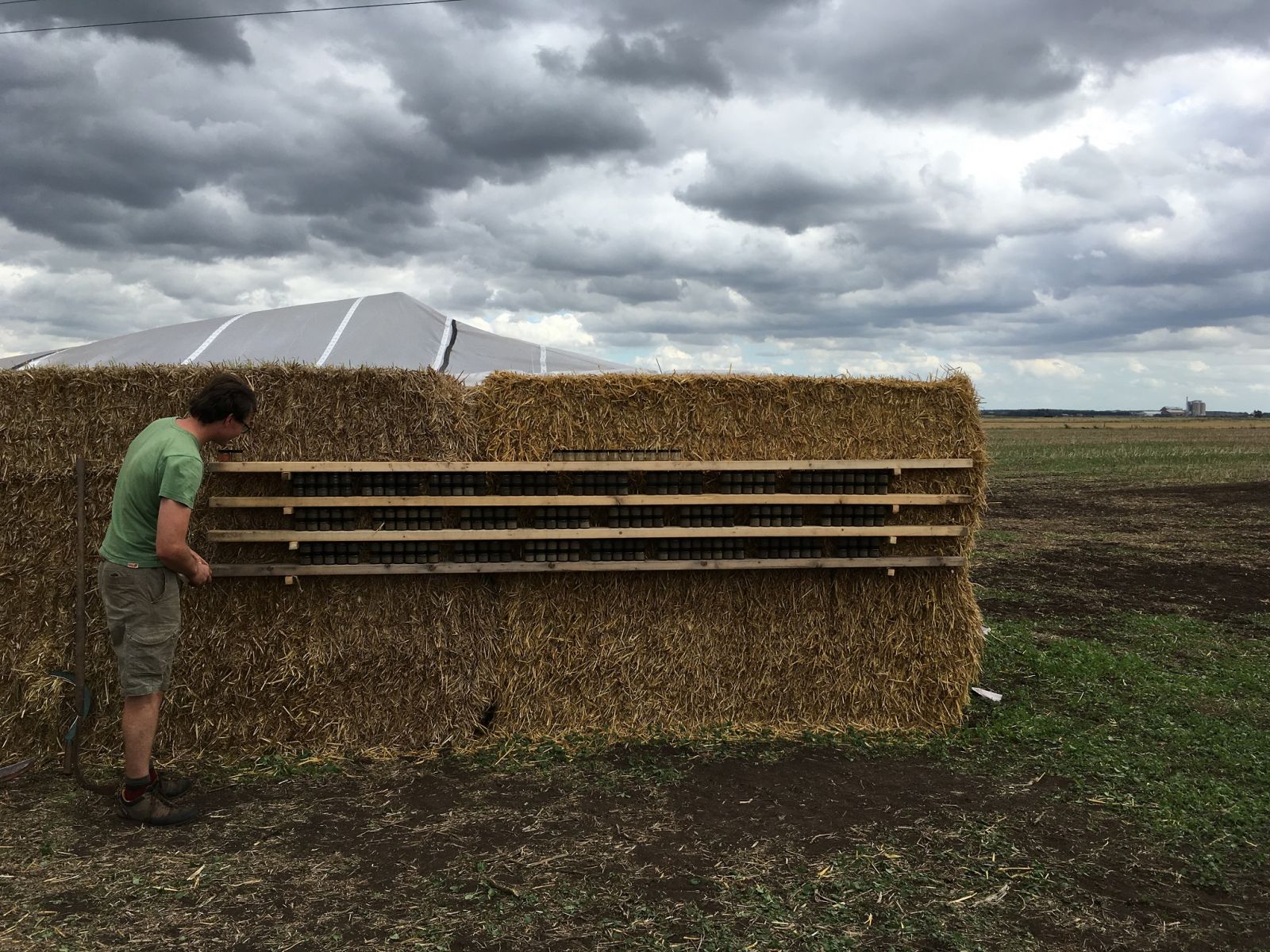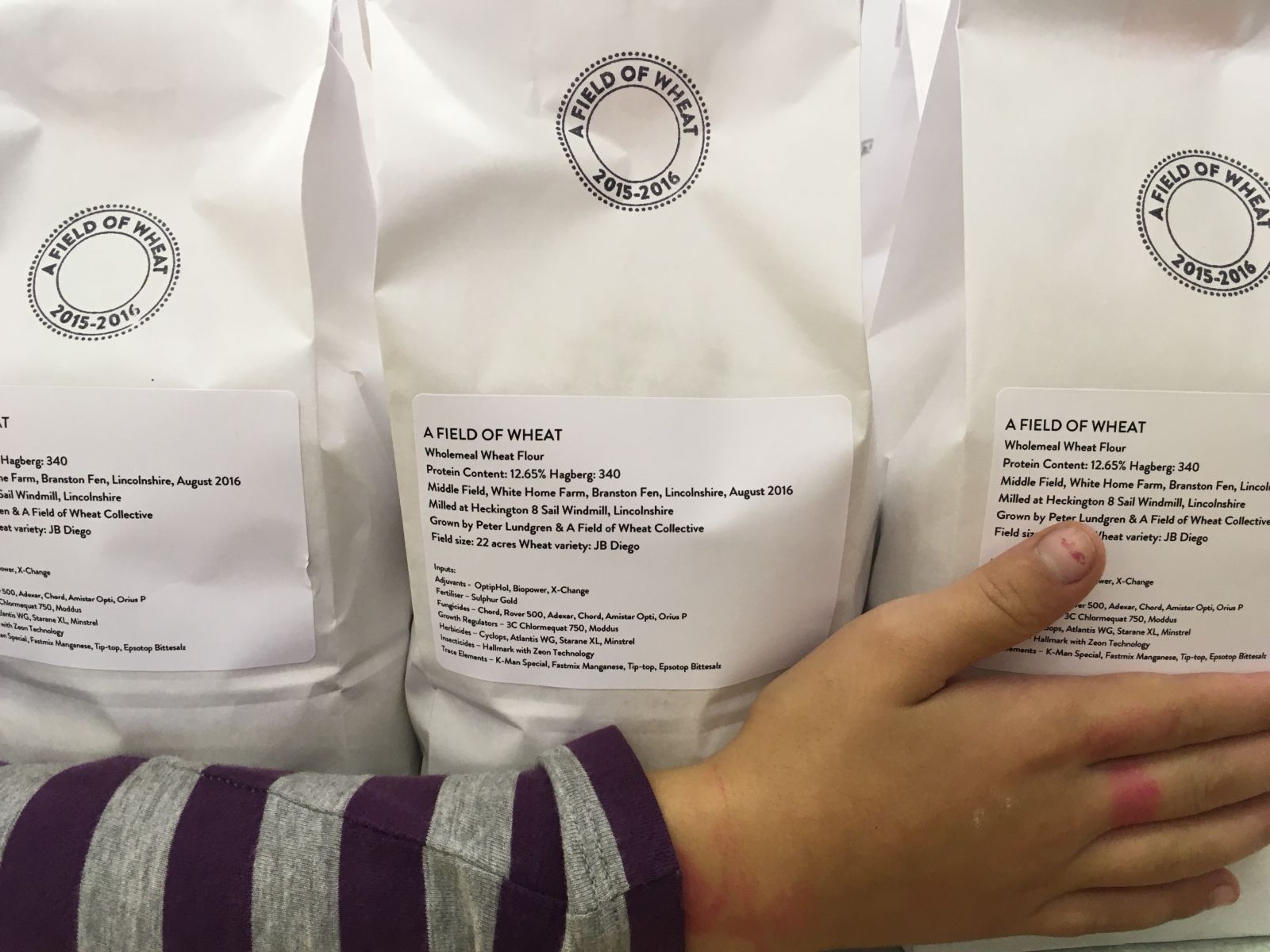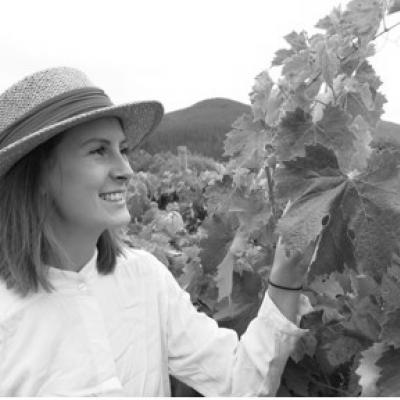New perspectives on farming
10 March 2017
 ©New perspectives on farming
©New perspectives on farmingWhat happens when 42 people co-farm a field of wheat?
In September 2015, 42 people; a motley bunch of bakers and bankers, neighbours and scientists each co-invested £200 in a field of wheat in fertile Lincolnshire. The field is owned by conventional arable farmer Peter Lundgren, who (in a moment of madness) agreed to let these 42 people help decide what he was going to do with his 20 acre field that year. I was one of those collective members and this was the start of an eye-opening, emotional and practical journey - ‘A year in the life of a wheat farmer.’
The project called ‘A Field of Wheat’ was initiated by two artists; Anne-Marie Culhane and Ruth Levene, as a culmination of their 2 years of research in the arable fields of Lincolnshire. They explain why they began researching wheat, “These vast ‘invisible’ landscapes are often devoid of human presence - we wanted to bring people to these spaces and make them visible. 'A Field of Wheat' allows people to consider the central role of food and agriculture in our cultural, spiritual, social, ecological and economical lives.”
Decisions made...
As the year progressed the collective made two key decisions together; how much nitrogen (N) fertiliser to apply (if any) and what to do with the grain? I am still amazed that this collective of people came to a harmonious decision despite all our differing perspectives and ideas; from lifelong organic advocates to bottom-line businessmen, everyone had their say.

(Farmer Peter Lungdren inspecting the quality of his co-farmed field of wheat)
The first decision arose in January; Peter explained how much N he would normally apply and why: “Applying N fertiliser increases the size of the ear (grain-bearing tip) and the size and weight of the grain but it also causes the cells in the plant stem to elongate, weakening the straw which can lead to lodging. Lodging reduces the quality and quantity of the crop, and makes harvesting difficult. However we can (and it is usual to) address this lodging problem using plant growth hormones that shorten the straw.”
This sounded bizarre to many of us - Peter was suggesting we apply fertiliser to make the grain grow heavier, but then also spray plant growth hormones to ensure the wheat doesn’t grow too much - surely that’s a contradiction? We realised there was so much we didn’t understand... the complexity of the decision was mind-blowing. The collective were all incredibly appreciative of the detailed breakdown of how and why Peter normally did things - we questioned, suggested, and learnt some hard realities about what it was going to take to grow our field of wheat.
The reality...
Our first wake up call was that we were growing a modern wheat variety, JB Diego, which is normally sold as a commodity on the global markets, usually for animal feed. One collective member, and long-time heritage wheat grower, John Letts explained, “Peter has very little room for manoeuvre because of the variety he has chosen to grow and the way in which this variety has to be grown to succeed. For example, it would be economically insane to suggest that he not apply chemical fertiliser at the rate/timing he has learned is the most appropriate given his soil conditions, local climate, current state of the crop, etc. Using organic compost just wouldn’t work as modern wheat varieties have shallow root systems and need to absorb lots of soluble N, regularly and rapidly.”
We were shocked about how much of a trap we seemed to already be in. As John Letts explained further, “All subsequent decisions Peter will have to make this growing season regarding fungicide sprays, further N applications, pesticide sprays (?), spraying with glyphosate before harvest to ensure even ripening (?) all follow on from the first decision to plant a modern variety in a conventional farming system.”
I felt overwhelmed, I was no longer in a supermarket making an end-of-the-line decision - Peter had a 1/3 stake in this field, we were risking his livelihood. I was not alone in my conundrum. Collective member Carol shared her thoughts, “Before I started reading the posts and other articles about N, I would have been firmly against the use of nitrates. Whilst trying to be well informed about farming, I'm not a farmer and indeed as a city dweller for the last 40 years, no longer part of a rural community whose livelihood depends on it. As such I find myself feeling oddly uncomfortable, politically and emotionally, with the idea of imposing my relatively hard line views onto a farmer whose livelihood does depend on crop returns.”
Farming complexities...
I have eaten organic food most of my life and been dismayed at the thought of applying chemical fertilisers to land - I had learnt that N can run-off into rivers and damage our eco-systems, as well as destroying the soil. I asked Peter if he knew of any farmers growing wheat organically, or if he had ever tried himself? Peter responded, “There are a number of successful organic wheat growers but they specialise in targeting the premium organic bread making market. I don't know of any on my soil type. The weed burden here is very high and the weeds will outcompete cash crops making it economically unviable to control the weeds in the organic regime. Certainly without the premium for organic status it would be extremely difficult to grow profitable wheat crops if we didn't use artificial N and agrochemicals to increase yield and protect from disease and pests.”
At the time, I almost didn’t believe him (sorry Peter!), thinking these were all just excuses… but what I discovered was a complex web of decisions and risks with many variables that felt overwhelming even just at the scale of one field. It began to dawn on us that on the farm, organic is not the binary decision it is to many in the supermarket; conventional farmers have to take many risks and make many changes over years to grow organically.
We had some great inputs from other cereals experts in the collective as well, including ADAS Yield Enhancement Network advisor Daniel Kindred, who used the latest research to inform us all what he thought the optimum amount of N was. Eventually we voted as a collective to apply 1/5th of Peter’s normal N levels (as advised by Daniel), and leave a small strip of the field without any fertiliser.
Market complexities...
(Our very own wheat, milled and bagged up into flour. Everything that was added in the grain's life is printed on the label in contrast to the normal practice of only listing products added after the grain has been removed from the field)
We came up against another challenge when selling the wheat. Many of the collective wanted to avoid the complexities of the future markets or the global commodities game and sell to local bakers or mills. After much effort to find an alternative, it turned out millers and bakers were not interested in our wheat as it was not organic, and not a heritage variety. From the moment we planted JB Diego, we were funneled down a particular path, and even with 43 of us working together to find alternatives, there wasn’t really a way out. Eventually we sold our wheat to the co-operative Openfield - 79 tonnes. It turned out to be very high quality, so we could sell it as biscuit feed at £123/tonne. The last bit wouldn’t make a truck load, so we sold to a local place as chicken feed at £119/tonne. We also milled 100kg thanks to a friendly local miller. Each collective member got back £210.99, so we made a profit of £10.99 each. Not a bad investment really…but what a journey.
At a local harvest festival, we bagged up the 100kg of flour we had managed to get milled for our own use, and we had every single thing that was added on farm written in the ingredients list on the pack - fungicides, pesticides, fertilizers and all. The visitors and guests who came along were shocked, and so was I really. This was a powerful way to experience directly the realities of producing food, I had shared the risks with the farmer and I had made some decisions that really surprised me. What’s more, Peter saw that he only needed to apply 1/5th the amount of nitrogen and could still get a high quality crop.
It was exciting to see that by sharing the risk between many people the farmer was able to take riskier decisions and he effectively had 40 people looking out for him, researching and finding the best way to nurture that field. We got to share in the process of growing wheat and had a completely new understanding of what it takes to be a farmer. If you want to hear more from Peter Lundgren, tune into episode 6 of the radio show I co-create, Farmerama, where he tells us why he got involved in the first place.

(Tom Powell arranging his multitude of soil samples from different points on the field at the harvest festival)
For me one of the main things I learned last year was perfectly summed up by collective member Tom Powell, “I feel, like many other members, that I want my input to this decision to be informed by my understanding of the wider ecological and global impacts of fertilizer use. But when it comes to our own field of wheat, the pressures and impacts driving the decision are about something completely different. This is frustrating, but also illuminating as I think it reveals something quite fundamental about why it's so difficult to make progress in many issues around sustainability.” Previously, I never understood how people could use N fertilisers, but it started to become clear. Farming is an incredibly risky business, completely at the will of the elements and farmers must risk everything - their whole livelihood - with almost every decision. It was so clear that there is a huge imbalance as farmers must shoulder almost all the risk for very little reward.
OurField
I’m happy to say that inspired by my ‘Field of Wheat’ experience, myself and a few other girls involved in food and farming: Carolin Goethel, Annie Landless, Abi Glencross and Phoebe Tickell, have started OurField - a collective grains movement that aims to change the way we grow grains. We aim to help farmers have the opportunity to transition to practices that protect and build soil for future generations, and grow delicious and nutritious food. We want to help increase respect for farmers; by empowering them to share their journey with many others. We want to share the risk and reward of nurturing the soil and growing food. If many other people around the UK can be part of the farming journey and learn what it’s really like then we think that our perspectives and policies around food and farming would be much more effective and holistic going forward.
The first OurField collaboration is with conventional farmer, John Cherry, in Weston Hertfordshire - OurFieldWeston - and the decision process begins this month with 40 new co-investors. We want this to be the first of many OurField projects so we are documenting everything as we go and making a blueprint. The blueprint will be available at the end so other farmers and communities can bring farming into the mainstream and not have it be a divided system where 'farmer risks all.'
Abby Rose is a particle physicist turned farmer who thinks smaller-scale farming is the key to a resilient future. She writes:
'About 10 years ago my family started farming @vidacycle in Chile, where we produce natural wine, verjus and olive oil - it was through learning to be a farmer that I realised farming is a risky craft and farmers will play a big role in determining the Earth’s future. So I became committed to making sustainable farming sexy and mainstream. I developed @vidacycle_tech apps to use on our farm to collect important data out in the field, and now fellow farmers on multiple continents are using them. I help farmers share their stories and ideas through a monthly podcast I co-create, called @Farmerama_. I live in the UK most of the year and spend lots of my free time visiting farmers, hearing their stories and understanding how they nurture the land. My latest collaboration is @OurfieldProject which allows people to live the risks and rewards of being a farmer. Through shared experiences like these I think we can transform the narratives of our food and the land.'
Editor's note:
Explore more here:
All quotes included within the blog are taken from discussions that are published publicly through the online Field of Wheat forum.
All photo credits: Abby Rose


